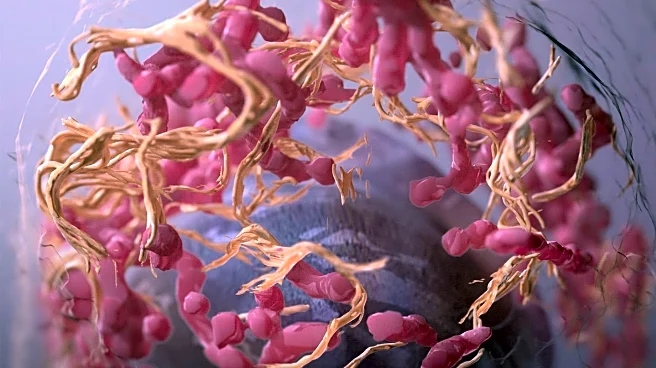What's Happening?
Recent advancements in the study of insulin signal transduction and glucose uptake have been highlighted in a new research collection. Insulin plays a crucial role in regulating glucose transport into skeletal muscle and adipose tissue, triggering a signaling cascade upon binding to its receptor. This cascade involves the activation of phosphoinositide 3-kinase and Akt, which phosphorylates AS160 to increase the abundance of the insulin-responsive glucose transporter GLUT4. Despite these known mechanisms, the complexity of insulin-stimulated glucose uptake signal transduction is still not fully understood. The collection aims to profile new research avenues, including phosphoproteomic analysis and the identification of novel insulin signaling substrates.
Why It's Important?
Understanding the mechanisms of insulin signal transduction is vital for addressing metabolic disorders such as diabetes. Insulin resistance is a key factor in the development of type 2 diabetes, and insights into the signaling pathways involved could lead to more effective treatments. The research collection emphasizes the need for innovative methods to quantify insulin action and explore metabolite/signaling crosstalk, which could uncover new therapeutic targets. By advancing knowledge in this area, researchers can contribute to improved management and prevention strategies for diabetes and related conditions.
What's Next?
The collection encourages further exploration of lesser-studied components of the insulin signaling network and aims to define critical gaps in the field. Researchers are expected to continue developing new technologies and methodologies to deepen understanding of insulin action. Collaborative efforts may focus on integrating phosphoproteomic data with bioinformatic approaches to map the dynamic signaling networks involved in glucose uptake. These efforts could lead to breakthroughs in identifying novel drug targets and improving therapeutic interventions for metabolic diseases.
Beyond the Headlines
The research collection highlights the potential for interdisciplinary collaboration in the field of insulin signal transduction. By combining expertise in biochemistry, bioinformatics, and clinical research, scientists can gain a more comprehensive understanding of the complex signaling networks involved. This approach may also foster innovation in the development of diagnostic tools and personalized medicine strategies for metabolic disorders, ultimately improving patient care and outcomes.









